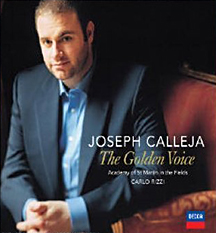Joseph Calleja: The Golden Voice

Back when I was a smartass college kid who knew everything, one of my relatives had a neighbor, Miss Mazola, an old tough cookie of an Italian-American woman who worked in a factory and lived alone in her modest, neat house on a busy St. Louis street. She had a loud, grating voice, a coarse laugh and social habits that reminded me too much of my own family’s blue collar background, one I was running from as fast as I possibly could. So naturally, I sneered at her. Discreetly, of course. As a smartass college kid who knew everything, it goes without saying that I was sensitive to others’ feelings, especially poor uneducated souls like Miss Mazola.
So imagine my surprise when one Saturday afternoon, having been volunteered by my relative to help Miss Mazola move something heavy in her house, I walked in and heard the weekly broadcast of the Metropolitan Opera playing on the radio. Turned out she listened every Saturday, without fail. As someone who prided himself on liking classical music, but not even vaguely ready to accept opera, I suddenly had to look at Miss Mazola in a whole new light. On the one hand, I have to admit I was impressed. On the other, I was more than a little bit resentful. Smartass college kids who know everything hate to be shown up as lacking in any regard, mainly because deep down inside, we’re nothing but one giant trainwreck of insecurities and inadequacies, imagined or otherwise.
Eventually, though, I did grow to like opera. I’m still very much a tyro as a fan—I can’t begin to tell you the story of all but a few operas. I just like the way it sounds and mostly think of the voices as instruments.
Which brings me to Joseph Calleja and this album, The Golden Voice. On first listen, both Marion and I were struck by how much this young Maltese-born tenor sounded like Caruso. I’m sure the producers and engineers did everything they could to capitalize on the similarity. The sound is indeed golden and the overall effect wonderfully pleasing.
But the format, a series of 14 arias—a couple of them duets with sopranos Anna Netrebko and Tatiana Lisnic—but all backed by the same orchestra [okay, it was tThe Academy of St. Martin-in-the-Fields, but still], delivers an overall experience with the dramatic operatic corners rounded off. Granted, listening to an entire opera with its huge dynamic range can send you constantly running for the volume control—this sometimes drives me crazy about classical music in general. But this album kind of suffers from the opposite: too much uniformity in volume and tempo and tone.
All that said, it really is beautiful—very, very listenable. It can give you a lovely taste of opera without the wild mood swings. And hearing Calleja’s Carusoesque voice filling our apartment, I found myself transported to Miss Mazola’s living room, reminded of the surprises everyone has inside if you just take a moment to find them.
Back to Blue Kitchen
Leave a comment